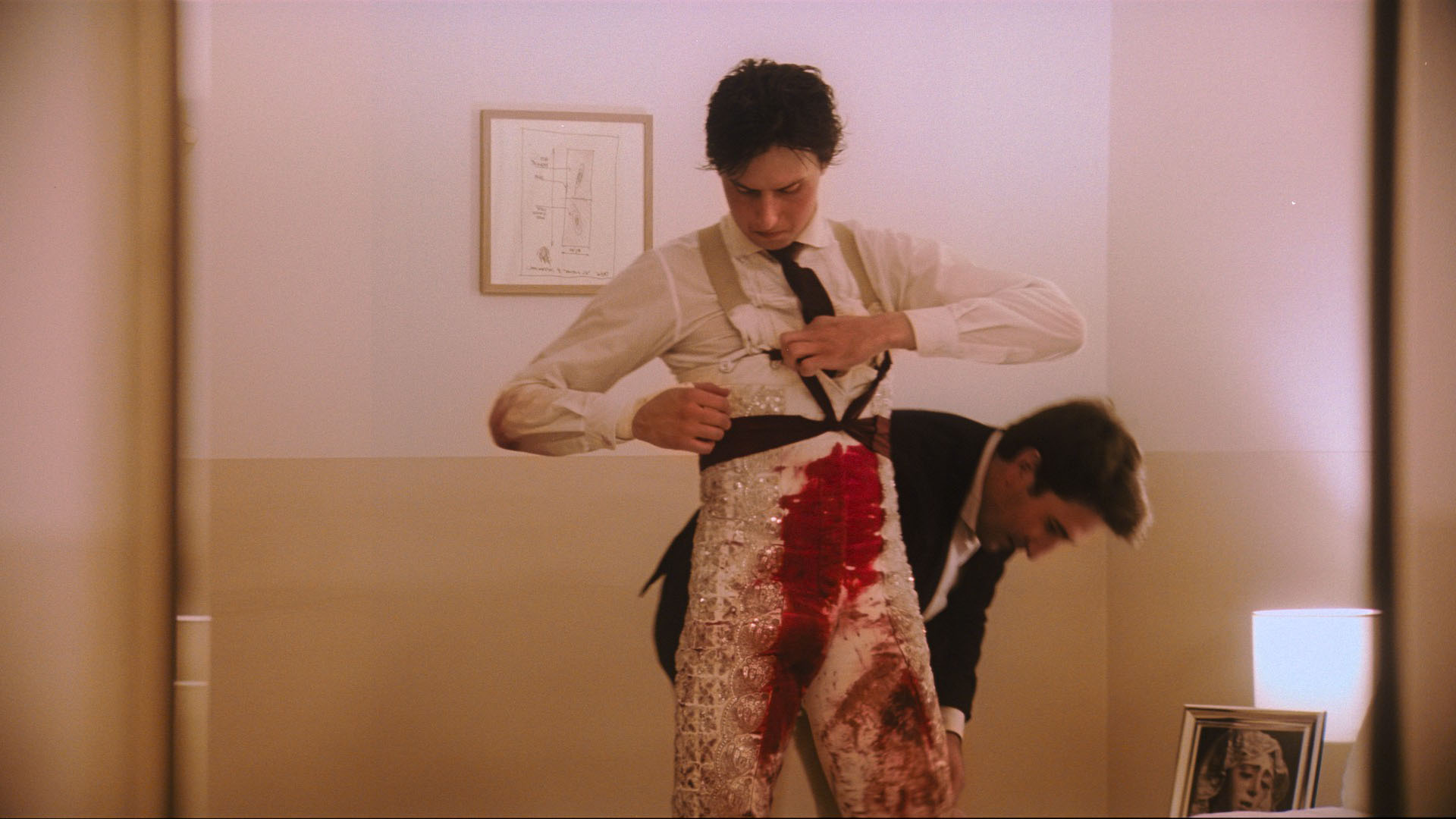30 Asturian films, including short and feature films, will be screened at the 61st edition of the Gijón International Film Festival. The event thus consolidates its commitment to making the region’s cinema more visible and demonstrates that there is an audiovisual sector in Asturias that is more and more represented every year.
Three Asturian titles will have their world premiere in the Official Selection
After debuting in 2017 with Bajo la piel de lobo, Samu Fuentes presents Retueyos, Los últimos pastores in the Official Selection. In it, he offers us a portrait that, crossed by the different seasons, reveals the way of life of two shepherd brothers from Picos de Europa dedicated to this ancestral activity that is doomed to extinction.

Los últimos pastores by Samu Fuentes
Also in Retueyos, Elisa Cepedal, who premiered at FICX her debut film El trabajo o a quién le pertenece el mundo in 2019, reconstructs with El cine, 5; the memory of Barredos, a small mining town in Asturias and the filmmaker’s place of origin, which is now a post-industrial landscape in decline. She does so through the oral testimonies of its inhabitants and the archive created by her grandfather, the village’s local photographer.

El cine, 5 by Elisa Cepedal
With seven awards behind her, obtained during the 58th FICX with her first film, La calle del agua, in which she rescued the photographer Benjamina Miyar from oblivion, Celia Viada Caso accompanies in Gregoria, presented in the Official Short Film Section, a ninety-year-old woman who never stopped working her plot of land, who went to the El Fontán market every week to sell her products and who was able to enjoy simple pleasures and freedom in her decisions.

Gregoria by Celia Viada Caso
The Esbilla Section has more Asturian presence than ever before
Two more feature films from Asturias will have their world premieres at FICX, in the Esbilla Premiere Section. In Flores del cemento, Luismi Pantiga offers us a debut film shot entirely in Gijón, a thriller with all the ingredients of neo-quinqui cinema: blood, drugs, bad company and easy money.

Flores del cemento by Luismi Pantiga
Literato is the latest film by Carlos Navarro, a comedy in which actor Maxi Rodríguez, who is also the scriptwriter, plays a separated man who returns to his home town in the Cuencas Mineras and becomes the talk of the town for having an affair with an old woman.

Literato by Carlos Navarro
The presence of Asturian cinema covers almost the entirety of Esbilla – Equí y n’otru tiempo, a section that offers stimulating looks at the past and the present in non-fiction. Álex Galán presents Il Mulín, a feature film about a village’s determination not to die in silence; Cigarreres, by Pablo A. Quiroga Prendes & Alejandro Nafría, tells the story of the last workers of the Tobacco Factory in the Cimavilla neighbourhood, heirs to a matriarchal tradition that lasted until its closure in 2002; Hinterland, by Manuel García Postigo, focuses on the first workers’ neighbourhoods that emerged in the mid-20th century in Gijón with the aim of providing accommodation for the growing mass of workers who came to the call of employment in the local industry; El amigo de todos, by José Antonio Quirós, presented in collaboration with the GESTO Cultural Society, traces from the memory of a child, now an adult, the figure of a former Nazi officer who settled in Asturias after World War II; La vida a través de Vega, by José Riveiro, approaches the Asturian Valentín Vega, considered one of the most relevant photographers of the last century; and also with a photographer as the protagonist, Crónicas de un viaje, by José Mata, offers an intimate vision of the creative mind of García de Marina.

Il Mulín by Álex Galán
Following its screening at the Rotterdam Festival, Esbilla Espectru presents Diego Llorente’s third feature film, Notas sobre un verano. It tells the story of a young woman who spends the summer in her native Asturias and asks herself whether the life she leads in Madrid is the life she really wants. The Espectru section also features Cantar a un batallón, an animated film by Inés G. Aparicio, which last year received the New Directors 2022 Award in its project phase, and is now being shown as a Work-In-Progress. In it, the director creates a story full of wonderful characters, free women, dreams without borders and unforgettable melodies. The project will be screened alongside Isabel Herguera’s El sueño de la sultana.

Notas sobre un verano by Diego Llorente
Local talent, universal views
The Asturies Curtiumetraxes section offers, with the support of the RTPA, films in this format divided into competition and exhibition sections.among the short films programmed in Competition is Les Praeres, in which the director Iván Menéndez documents the story of a man who stopped being a hunter because of the friendship created with a doe. In La nueche, by Diego Flórez, an old man recalls the summer nights of his childhood; and Lía Lugilde, who last year presented Breves anotaciones sobre una ruptura in the Muestra section, competes on this occasion with Los trazos que quedan de ti; a short film that rescues Ramón from oblivion, whose existence, hidden until recently in a box between the beams of a breadbox, comes to light after three generations. Elmer Guevara, who won the RTPA Award in this same section for two consecutive years, reveals in his latest work, Fañagüetu, skateboarding conceived as a way of giving meaning to life and overcoming insecurities.

Fañagüetu by Elmer Guevara
Three co-productions with other countries are also in competition: La main, by Javier San Miguel, made in co-production with France, reveals a story of ghosts and heartbreak that reflects on memory; La vista de las aves acuáticas, by Irene Menéndez Palomino & Jeff El-Eini, co-produced with the United States, witnesses an unexpected encounter that will change the way of seeing the life of the protagonist, who is also co-director of the film. Another co-production, in this case with Cuba, is Jíbaro, by Osmanys Sánchez Arañó, which tells the story of a young transgender man who, tired of suffering discrimination, decides to go into the mountains of Cuba’s Sierra Maestra. Finally, in Yashika. Mov, Antonio Llaneza Díaz brings to life the idea of identity theft in his protagonist.

Jíbaro by Osmanys Sánchez Arañó
In Asturies Curtiumetraxes – Muestra, seven works are presented: La fabulosa curva al equilibrio, by Graciela Mier, focuses on a woman who decides to take a radical turn in her life; Váter-casa-violín, by Laura Suárez Fernández, puts the focus on the protest of a violinist against the noise that the motorway generates at the doors of his house; Alma, by Paula Fernández, explores the reality of a person with dissociative disorder;with Lo Siento, Padre; Raúl Malagás, poses a great moral dilemma to a parish priest; Hablar de estas cosas, by Fernando Lorenzana, confronts a pending conversation between friends; Conexiones, by Gloria Gutiérrez Asla, approaches a young woman who would like to be who she says she really is in the virtual world; and Beatus Ille, by Nel González Iglesias, winner from Asturias of the competition Rodando en…. donde puedas competition organised by FICX with the Conseyu de Mocedá de Xixón and the Conseyu de la Mocedá del Principau d’Asturies, focuses on an unusual pandemic confinement.
For its part, the short film Bullicio de amor, by Harper, also winner of the Jury Prize in the Rodando en… donde puedas competition, will be screened in the Enfants Terribles Section. Asturias refugio climático, by Pablo de Soto & Nadia Penella, a work that complements the exhibition Motores del clima, at LABoral Centro de Arte, will also have a special screening.In addition, the feature film project by Asturian Alicia Moncholí, Los fines de semana, has been selected in the development modality of SEMILLERU Lab.


























